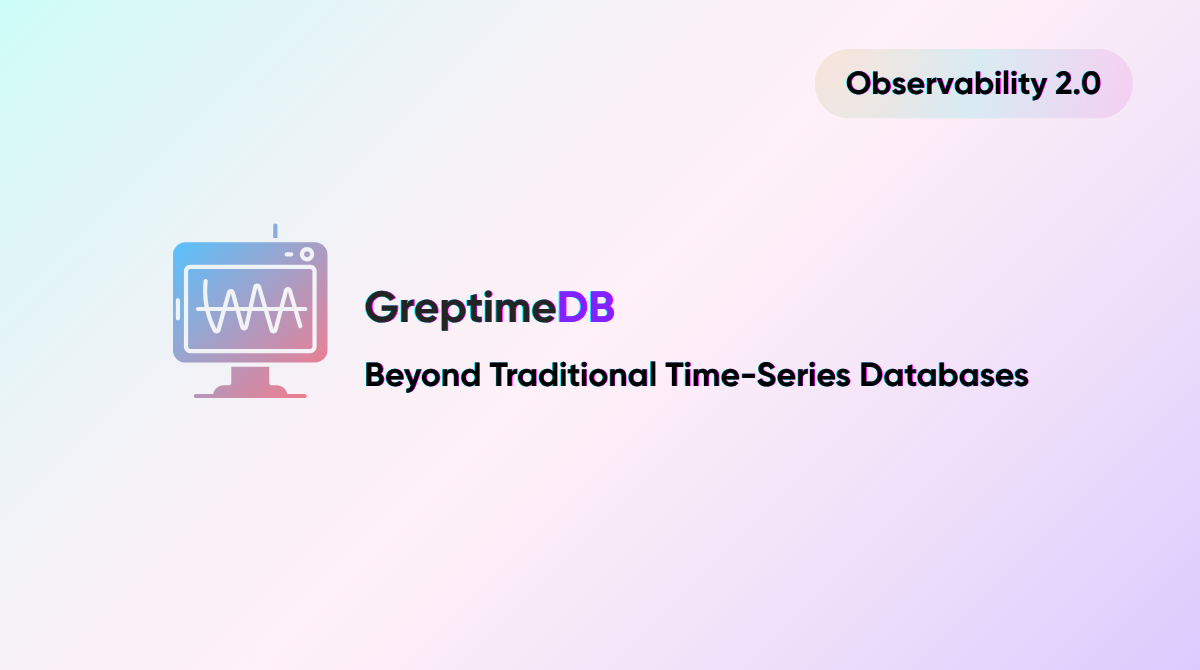
💬 Slack | 🐦 Twitter | 💼 LinkedIn
The observability landscape is rapidly evolving, and traditional time-series databases are struggling to keep pace. While InfluxDB has been a go-to solution for many teams, the emergence of cloud-native architectures and massive data volumes demands a fresh approach. Enter GreptimeDB – a next-generation observability database that's redefining what's possible in metrics, logs, and traces management.
The Performance Gap That Matters
Recent benchmarks reveal striking differences between these two platforms. GreptimeDB consistently delivers 3-5x better write performance compared to InfluxDB, particularly in high-cardinality scenarios that plague modern applications. This isn't just about raw numbers – it translates to real cost savings and operational efficiency.
What makes this difference? The answer lies in architectural decisions made from day one:
- Columnar storage optimization: GreptimeDB leverages advanced compression algorithms that achieve 30-40x compression ratios
- LSM-tree based design: Optimized for write-heavy workloads typical in observability scenarios
- Cloud-native architecture: Built for object storage, reducing costs by 70% compared to block storage solutions
Unified Data Model: The Game Changer
Here's where things get interesting. GreptimeDB treats metrics, logs, and traces as first-class citizens within a single data model. You're no longer juggling multiple systems or dealing with complex data pipelines between different storage engines.
Consider this scenario: Your application throws an error. With traditional setups, you'd:
- Check metrics in InfluxDB
- Dig into logs in Elasticsearch
- Trace the request flow in Jaeger
With GreptimeDB's unified approach, all this data lives together, queryable through standard SQL. No more context switching, no more correlation headaches.
Real-World Impact: Edge Computing Excellence
The automotive industry provides a perfect example. GreptimeDB Edge has been deployed in production vehicles, handling 700K+ data points per second with just 5.7% CPU usage on embedded hardware. Try running InfluxDB on a Qualcomm Snapdragon chip – the resource consumption alone would make it impractical.
This isn't theoretical. Leading EV manufacturers are achieving 40x compression ratios on CAN bus data, reducing bandwidth costs dramatically while maintaining real-time analytics capabilities.
The Vector Search Advantage
Modern observability isn't just about time-series data anymore. Semantic search across logs and traces is becoming essential. GreptimeDB v0.10 introduced native vector search capabilities, enabling intelligent similarity queries that traditional databases simply can't handle.
Imagine finding all error logs that are semantically similar to a specific failure pattern, even when the exact wording differs. This capability positions GreptimeDB ahead of legacy solutions in the AI-driven observability era.
Making the Switch: What You Need to Know
Migration complexity often keeps teams stuck with suboptimal solutions. GreptimeDB's MySQL protocol compatibility means your existing tools and dashboards work immediately. Grafana, Prometheus, and other observability tools integrate seamlessly.
The learning curve is minimal, but the performance gains are substantial. Early adopters report 50-80% reduction in observability infrastructure costs after switching from InfluxDB-based stacks.
Ready to experience next-generation observability? Start with GreptimeCloud's free tier and see the difference for yourself. Your infrastructure – and your budget – will thank you.
About Greptime
GreptimeDB is an open-source, cloud-native database purpose-built for real-time observability. Built in Rust and optimized for cloud-native environments, it provides unified storage and processing for metrics, logs, and traces—delivering sub-second insights from edge to cloud —at any scale.
GreptimeDB OSS – The open-sourced database for small to medium-scale observability and IoT use cases, ideal for personal projects or dev/test environments.
GreptimeDB Enterprise – A robust observability database with enhanced security, high availability, and enterprise-grade support.
GreptimeCloud – A fully managed, serverless DBaaS with elastic scaling and zero operational overhead. Built for teams that need speed, flexibility, and ease of use out of the box.
🚀 We’re open to contributors—get started with issues labeled good first issue and connect with our community.
